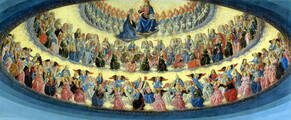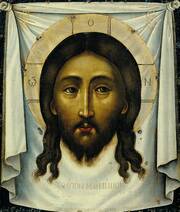The vocation of every person is to be a saint!
This universal call to holiness reveals the greatness of God's love for us and the dignity of every human being. It is as much a recurring theme for Pope Francis, as it was for Papa Benedict XVI and St John Paul II, who beatified 1,340 people and canonized 483 saints. If we could see the beauty of the vocation God is calling us to live in love, we might just sing a song as beautiful as the lark's (recorded here on the Cornish coast) ![]()
Benedict XVI: "We might ask ourselves: can we, with our limitations, our weaknesses, aim so high? During the liturgical year, the Church invites us to commemorate a host of saints, the ones who lived charity to the full, who knew how to love and follow Christ in their daily lives. They tell us that it is possible for everyone to take this road. In every epoch of the Church’s history, on every latitude of the world map, the saints belong to all the ages and to every state of life, they are actual faces of every people, language and nation. And they have very different characters."
All those in heaven are saints, some of whom have been formally recognised by the Church. Their lives are a wonderful sign of hope that, with God's grace, holiness is possible for us all. What's more, the saints are part of our family and love to help us from heaven, interceding for us. Benedict XVI gave some wonderful catecheses on the lives of the saints from the Apostles and early Church Fathers through to modern day saints, blesseds and general dudes.
We are helped to become saints by the gifts of the Holy Spirit, the Sacraments of the Church, by living the virtues and obeying the Commandments. St John Paul II's profound series of catechesis on Human Love in the Divine Plan is also included here, along with Pope Francis's catecheses on Mercy & Christian Hope and sections on Vocations, the Family, the Sick, Consecrated Life and Mission.
Saints, blesseds and dudes
included so far on Totus2us
![]() Albert the Great - Aloysius Gonzaga - Alphonsus Liguori - Alphonsus Rodriguez SJ - Ambrose Autpert - Ambrose of Milan - Andrew the Apostle - Andrew Bobola - Angela of Foligno - Anselm - Anthony of Padua - Aphraates the Sage - Athanasius - Augustine of Hippo - Augustine of Canterbury
Albert the Great - Aloysius Gonzaga - Alphonsus Liguori - Alphonsus Rodriguez SJ - Ambrose Autpert - Ambrose of Milan - Andrew the Apostle - Andrew Bobola - Angela of Foligno - Anselm - Anthony of Padua - Aphraates the Sage - Athanasius - Augustine of Hippo - Augustine of Canterbury
![]() Barnabas - Bartholomew - Basil the Great - Bede the Venerable - Pope Benedict XVI - Benedict of Norcia - Bernard of Clairvaux - Boethius - Bonaventure - Boniface - Bridget of Sweden
Barnabas - Bartholomew - Basil the Great - Bede the Venerable - Pope Benedict XVI - Benedict of Norcia - Bernard of Clairvaux - Boethius - Bonaventure - Boniface - Bridget of Sweden
![]() Cajetan - Cassiodorus - Catherine of Alexandria - Catherine of Bologna - Catherine of Genoa - Catherine of Siena - Catherine Labouré - Cassiodorus - Charbel Makhlouf - Charles Borromeo - Charles de Foucauld - Charles of St Andrew Houben - Chromatius of Aquileia - Clare of Assisi - Claude de la Colombière - Clement of Alexandria - Clement of of Rome - Columba - Crispin of Viterbo - Cyril & Methodius - Cyprian - Cyril of Alexandria - Cyril of Jerusalem
Cajetan - Cassiodorus - Catherine of Alexandria - Catherine of Bologna - Catherine of Genoa - Catherine of Siena - Catherine Labouré - Cassiodorus - Charbel Makhlouf - Charles Borromeo - Charles de Foucauld - Charles of St Andrew Houben - Chromatius of Aquileia - Clare of Assisi - Claude de la Colombière - Clement of Alexandria - Clement of of Rome - Columba - Crispin of Viterbo - Cyril & Methodius - Cyprian - Cyril of Alexandria - Cyril of Jerusalem
![]() Dante Alighieri - David - Dominic Guzman - Dominic Savio
Dante Alighieri - David - Dominic Guzman - Dominic Savio
![]() Ephrem the Syrian - Elizabeth of Hungary - Elizabeth Ann Seton - Eusebius of Caesarea - Eusebius of Vercelli
Ephrem the Syrian - Elizabeth of Hungary - Elizabeth Ann Seton - Eusebius of Caesarea - Eusebius of Vercelli
![]() Faustina Kowalska - Francis of Assisi - Francis de Sales - Francis Xavier - Francisco Marto
Faustina Kowalska - Francis of Assisi - Francis de Sales - Francis Xavier - Francisco Marto
![]() George Preca - Germanus of Constantinople - Gertrude the Great - Gianna Beretta Molla - Gregory the Great - Gregory Nazianzus - Gregory of Nyssa
George Preca - Germanus of Constantinople - Gertrude the Great - Gianna Beretta Molla - Gregory the Great - Gregory Nazianzus - Gregory of Nyssa
![]() Hildegard of Bingen - Hilary of Poitiers - Hugh & Richard of Saint-Victor
Hildegard of Bingen - Hilary of Poitiers - Hugh & Richard of Saint-Victor
![]() Ignatius of Antioch - Ignatius of Loyola - Irenaus of Lyons - Isidore of Seville
Ignatius of Antioch - Ignatius of Loyola - Irenaus of Lyons - Isidore of Seville
![]() Jacinta Marto - James the Apostle - James the Apostle (the Lesser) - Jeanne Delanoue - Jerome - Joan of Arc - John the Apostle & Evangelist - Pope John XXIII - John of Avila - John the Baptist - John Bosco - John Climacus - John of the Cross - John Chrysostom - John Damascene - John Duns Scotus - John Eudes - John Fisher - John Leonardi - John Henry Newman - John Mary Vianney - John Nepomucene Neumann - Pope John Paul I - Pope John Paul II - John of Salisbury - John Scotus Erigena - Josaphat Kuntsevych - Josemaría Escrivá - Julian of Norwich - Joseph - Joseph Cafasso - Joseph Cottolengo - Julian of Norwich - Juliana of Cornillon - Justin - Judas the Iscariot - Jude the Apostle - Justin
Jacinta Marto - James the Apostle - James the Apostle (the Lesser) - Jeanne Delanoue - Jerome - Joan of Arc - John the Apostle & Evangelist - Pope John XXIII - John of Avila - John the Baptist - John Bosco - John Climacus - John of the Cross - John Chrysostom - John Damascene - John Duns Scotus - John Eudes - John Fisher - John Leonardi - John Henry Newman - John Mary Vianney - John Nepomucene Neumann - Pope John Paul I - Pope John Paul II - John of Salisbury - John Scotus Erigena - Josaphat Kuntsevych - Josemaría Escrivá - Julian of Norwich - Joseph - Joseph Cafasso - Joseph Cottolengo - Julian of Norwich - Juliana of Cornillon - Justin - Judas the Iscariot - Jude the Apostle - Justin
K Kizito ![]() Lawrence of Brindisi - Pope Leo XIII - Leonard Murialdo - Leopold Mandić of Castelnuovo - Louis Marie Grignion de Montfort - Leo the Great
Lawrence of Brindisi - Pope Leo XIII - Leonard Murialdo - Leopold Mandić of Castelnuovo - Louis Marie Grignion de Montfort - Leo the Great
![]() Margaret Clitherow - Margaret Mary Alacoque - Marguerite Bourgeoys - Marguerite d'Oingt - Maria Goretti - Matilda of Hackeborn - Matthew the Apostle & Evangelist - Matthias the Apostle - Maximilian Maria Kolbe - Maximus the Confessor - Maximus of Turin
Margaret Clitherow - Margaret Mary Alacoque - Marguerite Bourgeoys - Marguerite d'Oingt - Maria Goretti - Matilda of Hackeborn - Matthew the Apostle & Evangelist - Matthias the Apostle - Maximilian Maria Kolbe - Maximus the Confessor - Maximus of Turin
![]() Nicholas - Nicholas Owen - Noël Chabanel
Nicholas - Nicholas Owen - Noël Chabanel
![]() Odo of Cluny - Oliver Plunkett - Origen of Alexandria
Odo of Cluny - Oliver Plunkett - Origen of Alexandria
![]() Paul the Apostle - Pope Paul VI - Paula Frassinetti - Paulinus of Nola - Patrick - Peter the Apostle - Peter Canisius - Peter Damian - Peter Lombard - Peter the Venerable - Philip the Apostle - Philip Neri - Pier Giorgio Frassati - Padre Pio of Pietrelcina - Pope Pius X - Pope Pius XI - Pope Pius XII - Priscilla & Aquila - Pseudo-Dionysius the Areopagite
Paul the Apostle - Pope Paul VI - Paula Frassinetti - Paulinus of Nola - Patrick - Peter the Apostle - Peter Canisius - Peter Damian - Peter Lombard - Peter the Venerable - Philip the Apostle - Philip Neri - Pier Giorgio Frassati - Padre Pio of Pietrelcina - Pope Pius X - Pope Pius XI - Pope Pius XII - Priscilla & Aquila - Pseudo-Dionysius the Areopagite
![]() Rabanus Maurus - Reginald of Orleans - Rita of Cascia - Robert Bellarmine - Romanus the Melodist - Rose of Lima - Rupert of Deutz - Rupert Mayer
Rabanus Maurus - Reginald of Orleans - Rita of Cascia - Robert Bellarmine - Romanus the Melodist - Rose of Lima - Rupert of Deutz - Rupert Mayer
![]() Scholastica - Simon the Apostle - Simon of Lipnica - Stanislaus - Stephen - Symeon the New Theologian
Scholastica - Simon the Apostle - Simon of Lipnica - Stanislaus - Stephen - Symeon the New Theologian ![]() Tarcisius - Mother Teresa of Calcutta - Teresa of Jesus - Teresa Benedicta of the Cross - Tertullian - Theodore the Studite - Thérèse of the Child Jesus - St Thomas the Apostle - Thomas Aquinas - Thomas More - Timothy & Titus,
Tarcisius - Mother Teresa of Calcutta - Teresa of Jesus - Teresa Benedicta of the Cross - Tertullian - Theodore the Studite - Thérèse of the Child Jesus - St Thomas the Apostle - Thomas Aquinas - Thomas More - Timothy & Titus,
Papa Benedict XVI's Catechesis on Holiness
General Audience, Wednesday 13 April 2011 - in Croatian, English, French, German, Italian, Portuguese & Spanish
"Dear brothers and sisters,
At the general audiences in the past 2 years we've been accompanied by the figures of so many saints: we've learned to know them more closely and to understand that the whole of the Church’s history is marked by these men and women who with their faith, with their charity, and with their life have been beacons for so many generations, as they are for us too. The saints expressed in various ways the powerful and transforming presence of the Risen One. They let Jesus so totally overwhelm their life that they could say with St Paul “it is no longer I who live, but Christ who lives in me.”. Following their example, seeking their intercession, entering into communion with them, “brings us closer to Christ, so our companionship with the saints joins us to Christ, from whom as from their fountain and head issue every grace and the life of the People of God itself.” At the end of this series of catecheses, therefore, I'd like to offer some thoughts on what holiness is.
What does it mean to be holy? Who is called to be holy? We are often led to think that holiness is a goal reserved for a few elect. St Paul, instead, speaks of God’s great plan and affirms: “In him - Christ - (God) chose us before the foundation of the world, that we should be holy and blameless before him” (Eph 1:4). And he was speaking about all of us. At the centre of the divine plan is Christ in whom. God shows his Face, in accord with the favour of his will. The Mystery hidden in the centuries is revealed in its fullness in the Word made flesh. And Paul then says: “in him all the fullness of God was pleased to dwell” (Col 1:19). In Christ the living God made himself close, visible, audible and tangible so that each one might draw from his fullness of grace and truth. Therefore, the whole of Christian life knows one supreme law, which St Paul expresses in a formula that recurs in all his holy writings: in Jesus Christ. Holiness, the fullness of Christian life, does not consist in carrying out extraordinary enterprises but in being united with Christ, in living his mysteries, in making our own his example, his thoughts, his behaviour. The measure of holiness stems from the stature that Christ achieves in us, in as much as with the power of the Holy Spirit, we model our whole life on his. It is being conformed to Jesus, as St Paul says: “For those whom he foreknew he also predestined to be conformed to the image of his Son” (Rom 8:29). And St Augustine exclaimed: “my life shall be a real life, being wholly filled by you. The Second Vatican Council, in the Dogmatic Constitution on the Church, speaks with clarity of the universal call to holiness, saying that no one is excluded: “The forms and tasks of life are many but holiness is one — that sanctity which is cultivated by all who act under God’s Spirit and… follow Christ, poor, humble and cross-bearing, that they may deserve to be partakers of his glory” (Lumen Gentium, 41).
But the question remains: how can we take the path to holiness, in order to respond to this call? Can I do this on my own initiative? The answer is clear. A holy life is not primarily the result of our efforts, of our actions, because it is God, the three times Holy who sanctifies us, it is the Holy Spirit’s action that enlivens us from within, it is the very life of the Risen Christ that is communicated to us and that transforms us. To say so once again with the Second Vatican Council, “the followers of Christ, called by God not in virtue of their works but by his design and grace, and justified in the Lord Jesus, have been made sons of God in the baptism of faith and partakers of the divine nature, and so are truly sanctified. They must therefore hold onto and perfect in their lives that sanctification which they have received.” Holiness, therefore, has its deepest root in the grace of baptism, in being grafted on to the Paschal Mystery of Christ, by which his Spirit is communicated to us, his very life as the Risen One. St Paul strongly emphasizes the transformation that baptismal grace brings about in man and he reaches the point of coining a new terminology, forged with the preposition “with”: dead-with, buried-with, raised-with, brought to life-with, with Christ; our destiny is indissolubly linked to his. “We were buried therefore with him by baptism” he writes, “into death, so that as Christ was raised from the dead ... we too might walk in newness of life” (Rom 6:4). Yet God always respects our freedom and asks that we accept this gift and live the requirements it entails and he asks that we let ourselves be transformed by the action of the Holy Spirit, conforming our will to the will of God.
How can it happen that our manner of thinking and our actions become thinking and action with Christ and of Christ? What is the soul of holiness? Once again the Second Vatican Council explains; it tells us that Christian holiness is nothing other than charity lived to the full. “God is love, and he who abides in love abides in God, and God abides in him” (1 Jn 4:16). Now God has poured out his love in our hearts through the Holy Spirit who has been given to us; therefore the first and most necessary gift is charity, by which we love God above all things and our neighbour through love of him. But if charity, like a good seed, is to grow and fructify in the soul, each of the faithful must willingly hear the word of God and carry out his will with deeds, with the help of his grace. He must frequently receive the sacraments, chiefly the Eucharist, and take part in the holy liturgy; he must constantly apply himself to prayer, self-denial, active brotherly service and the exercise all the virtues. This is because love, as the bond of perfection and fullness of the law governs, gives meaning to, and perfects all the means of sanctification.” Perhaps this language of the Second Vatican Council is a little too solemn for us, perhaps we should say things even more simply. What is the essential? The essential means never leaving a Sunday without an encounter with the Risen Christ in the Eucharist; this is not an additional burden but is light for the whole week. It means never beginning and never ending a day without at least a brief contact with God. And, on the path of our life it means following the “signposts” that God has communicated to us in the Ten Commandments, interpreted with Christ, which are merely the explanation of what love is in specific situations. It seems to me that this is the true simplicity and greatness of a life of holiness: the encounter with the Risen One on Sunday; contact with God at the beginning and at the end of the day; following, in decisions, the “signposts” that God has communicated to us, which are but forms of charity. “Hence the true disciple of Christ is marked by love both of God and of neighbour” (Lumen Gentium, 42). This is the true simplicity, greatness and depth of Christian life, of being holy.
This is why St Augustine, in commenting on the 4th chapter of the 1st Letter of St John, could make a bold statement: “Dilige et fac quod vis [Love and do what you will]” And he continued: “If you keep silent, keep silent by love: if you speak, speak by love; if you correct, correct by love; if you pardon, pardon by love; let love be rooted in you, and from the root nothing but good can grow.” Those who are guided by love, who live charity to the full, are guided by God, because God is love. Hence these important words apply: “Dilige et fac quod vis”, “Love and do what you will.”
We might ask ourselves: can we, with our limitations, with our weaknesses, aim so high? During the liturgical year, the Church invites us to commemorate a host of saints, the ones, that is, who lived charity to the full, who knew how to love and follow Christ in their daily lives. They tell us that it is possible for everyone to take this road. In every epoch of the Church’s history, on every latitude of the world map, the saints belong to all the ages and to every state of life, they are actual faces of every people, language and nation. And they have very different characters. Actually I must say that also for my personal faith many saints, not all, are true stars in the firmament of history. And I would like to add that for me not only a few great saints whom I love and whom I know well are “signposts”, but precisely also the simple saints, that is, the good people I see in my life who will never be canonized. They are ordinary people, so to speak, without visible heroism but in their everyday goodness I see the truth of faith. This goodness, which they have developed in the faith of the Church, is for me the most reliable apology of Christianity and the sign of where the truth lies.
In the Communion of Saints, canonized and not canonized, which the Church lives thanks to Christ in all her members, we enjoy their presence and their company and cultivate the firm hope that we shall be able to imitate their journey and share one day in the same blessed life, eternal life.
Dear friends, how great and beautiful, as well as simple is the Christian vocation seen in this light! We are all called to holiness: it is the very measure of Christian living. Once again St Paul expresses it with great intensity when he writes: “grace was given to each of us according to the measure of Christ’s gift…. His gifts were that some should be apostles, some prophets, some evangelists, some pastors and teachers, to equip the saints for the work of ministry, for building up the body of Christ, until we all attain to the unity of the faith and of the knowledge of the Son of God, to mature manhood, to the measure of the stature of the fullness of Christ” (Eph 4:7, 11-13). I'd like to ask all to open themselves to the action of the Holy Spirit, who transforms our life, to be, we too, as small pieces in the great mosaic of holiness that God continues to create in history, so that the face of Christ may shine out in the fullness of its splendour. Let us not be afraid to aim high, for God’s heights; let us not be afraid that God will ask too much of us, but let ourselves be guided by His Word in every daily action, even when we feel poor, inadequate sinners. It will be He who transforms us in accordance with his love. Thank you."
- Flash is required!
Mother Teresa: "Sanctity is not the luxury of the few.
It is a simple duty, for you & for me. ... Very great holiness becomes very simple if we belong fully to Our Lady."
"We all know that there is a God who loves us, who has made us. We can turn and ask Him, "My Father, help me now. I want to be holy, I want to be good, I want to love." Holiness is not a luxury for the few; it is not just for some people. It is meant for you and for me and for all of us. It is a simple duty, because if we learn to love, we learn to be holy.
The first step to becoming holy is to will it. Jesus wants us to be holy as His Father is. Holiness consists of carrying out God's will with joy. The words 'I want to be holy' mean: 'I will divest myself of everything that is not of God; I will divest myself and empty my heart of material things. I will renounce my own will, my inclinations, my whims, my fickleness; and I will become a generous slave to God's will. With a will that is whole I will love God, I will opt for Him, I will run toward Him, I will reach Him, I will possess Him.' But it all depends on these words; 'I want' or 'I do not want.' I have to pour all of my energy into the words 'I want'.



